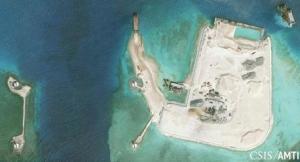U.S. admiral warns against Chinese fighter flights from South China Sea runways
The artificial island at the southern end of Mischief Reef showing a newly-built seawall on its north …
By Rujun Shen
Feb 15 2016
SINGAPORE (Reuters) - Any move by China to fly jet fighters from runways on its new man-made islands in the disputed South China Sea would be destabilizing and would not deter U.S. flights over the area, a senior U.S. naval officer said on Monday.
Vice Admiral Joseph Aucoin, the commander of the U.S. Navy's Seventh Fleet, also urged Beijing to be more open over its intentions in the South China Sea, saying it would relieve "some of the angst we are now seeing".
"We are unsure where they are taking us," Aucoin said of China's recent moves during briefing with journalists in Singapore.
"So we are going to sail, fly, operate throughout these waters....like we have been doing for so long," he said.
That, he added, included "flying over that airspace."
Chinese and regional security analysts expect Beijing to start using its new runways in the disputed Spratlys archipelago for military operations in the next few months.
It last month tested for the first time the 3,000-metre runway built on a reclamation on Fiery Cross Reef by landing several civilian airliners from Hainan island. (Link to previous stories)
Aucoin said he could not give an estimate when he expected Chinese military jets to start operating in the Spratlys.
"It's a destabilizing uncertainty," he said when asked about the impact of possible Chinese jet fighter patrols. He said it would raise questions about the intentions.
China claims much of the South China Sea, while Brunei, Malaysia, the Philippines, Taiwan and Vietnam have rival claims.
International concern is growing over tensions in the waterway, which carries an estimated $5 trillion in trade every year, including oil used by northeast Asian nations.
Since last October, two U.S. warships have sailed close to Chinese claimed features in the Spratly and Paracel archipelagoes in so-called freedom-of-navigation operations that Beijing has warned are provocative.
Chinese officials complained last December that a U.S. B-52 bomber flew close to one of Beijing's artificial islands.
Other U.S. surveillance and transport planes routinely fly throughout the South China Sea.
Chinese warships and civilian vessels routinely flank U.S. naval ships in the area, but Aucoin said engagement between the two navies would continue, saying the relationship was "positive".
"(The) International Law of the Sea has helped (China) for so many years. We just want them to respect those rights so that we can all continue to prosper," he said.


No comments:
Post a Comment
Comments always welcome!